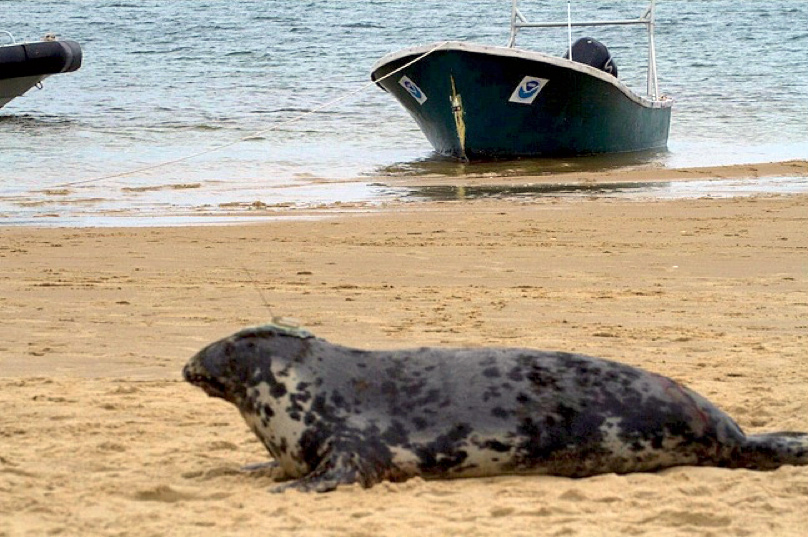On June 13th 2013, the first capture and tagging of adult and sub-adult gray seals occurred on Cape Cod, MA. Dr. Gordon Waring, head of the seal research program at the Woods Hole Laboratory of NOAA’s Northeast Fisheries Science Center (NEFSC), served as chief scientist on this project that brought together a multidisciplinary team of researchers from the U.S. and Canada.
The suite of biological samples collected from each animal will allow researchers to start answering questions on the biology, toxicology, ecology and health of these animals. In addition, a remarkable 9 tags were successfully deployed, including GPS tags (Duke University D. Johnston Lab) and satellite tags (NEFSC and Whalenet.org) which will allow a greater understanding into the movements of these animals in context with human (fisheries/coastal use areas) and seal ecological interactions.
The collaborative efforts of the The Northwest Atlantic Seal Research Consortium (NASRC) enabled the field team to maximize the types of samples and research priority objectives possible from this extraordinary field opportunity. The NEFSC seal tagging event brought together participants from the Northeast Fisheries Science Center (NEFSC)’s Woods Hole Laboratory, NOAA’s Northeast Regional Office (NERO), Duke University, Woods Hole Oceanographic Institution (WHOI), Provincetown Center for Coastal Studies (PCCS), Canada’s Department of Fisheries and Oceans (DFO), the International Fund for Animal Welfare (IFAW) on Cape Cod, the Riverhead Foundation for Marine Research and Preservation on Long Island, N.Y., the National Marine Life Center, Buzzards Bay, M.A., Marine Mammals of Maine, and the University of New England.
The The Northwest Atlantic Seal Research Consortium is honored to have received a SPOT tag donated by whalenet.org to tag an adult female gray seals captured in Chatham, MA on June 16, 2013. The citizen science project of NASRC, the Marine Animal Identification Network, is helping to track uniquely identifiable seals (entanglements, markings and flipper tags) and we hope that our tagged female adult gray seal 2013-152, a.k.a. ÒGracie,Ó will help serve as an ambassador to remind us of the collaborative efforts which make long term marine mammal research successful.
Keep your eyes out for Gracie out sunning and swimming in Chatham, M.A., track her movements on whalenet.org and MAIN and learn about the research and activities being supported by the The Northwest Atlantic Seal Research Consortium (NASRC). For questions or comments on NASRC, please email sealreasearch@whoi.edu.

